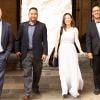
Just three weeks after the Alexander String Quartet announced that next season will be its last, the St. Lawrence String Quartet (SLSQ) is bidding its own sad farewell.
After 34 renowned seasons and acclaim around the world, the SLSQ will disband as an ensemble this year, but its members will remain active at Stanford University, where the Quartet has been in residence since 1998.
Following final performances at UC San Diego, Stanford, and Spoleto Festival USA, the SLSQ’s individual members will continue to perform, teach, direct Stanford’s chamber music program, and produce the annual St. Lawrence Chamber Music Seminar, in addition to pursuing other musical projects.

But the Quartet — which, after founding first violinist Geoff Nuttall died of pancreatic cancer in October 2022, initially went on hiatus and then resumed performing with guest artists — will cease to exist.
Along with thousands of music lovers in the San Francisco Bay Area, I had an unforgettable introduction to the then little-known SLSQ some three decades ago. The performance was in a small Santa Rosa school auditorium — at a series of chamber concerts organized by Jeffrey Kahane — where the Quartet from Toronto surprised, impressed, and conquered.
In sound and sight, Nuttall presented a startling appearance. Stretched out on his chair in an almost horizontal position, arms and legs akimbo, the violinist played with rare abandonment and concentration.
The other founding members of the SLSQ were second violinist Barry Shiffman, violist Lesley Robertson, and cellist Marina Hoover.
Today, Robertson is still with the Quartet. Owen Dalby has been second violinist since 2015, and Christopher Costanza has been the SLSQ’s cellist since 2003. Nuttall’s position was never filled.
The Quartet had an explosive career. Of its New York debut in 1992, Alex Ross wrote in The New York Times: “The Quartet’s stage manner was hip and casual [but with] an unmistakable seriousness of intent. The performance [of Alban Berg’s String Quartet, Op. 3] had a dangerous, unchecked edge; I have never heard anything quite like it. In the future, this Quartet should make its presence felt.”
Later, writing in The New Yorker, Ross said: “The four musicians of the St. Lawrence are remarkable not simply for the quality of their music-making, exalted as it is, but for the joy they take in the act of connection.”
An obituary of Nuttall described him as “a charismatic musician” and “widely admired.” He was Spoleto Festival USA’s director of chamber music for more than a decade, and the SLSQ appeared there regularly for 25 years. Spoleto will now be the site of the Quartet’s last performance together.

During its existence, the SLSQ performed and recorded hundreds of works. The group was so committed to Franz Joseph Haydn that in some single concerts it performed all six quartets from the composer’s Opus 20.
And yet, the SLSQ was also a prominent agent for new music, premiering works by, among others, John Adams, Ezequiel Viñao, Osvaldo Golijov, David Bruce, Derek Charke, Suzanne Hébert-Tremblay, Brian Current, Elizabeth Raum, Marcus Goddard, and R. Murray Schafer.
These composers, with whom the Quartet forged rich and abiding friendships, were inspired to return time and again to write for the SLSQ.
Adams wrote his 2008 String Quartet for the St. Lawrence, which premiered the work, recorded it for Nonesuch, and went on to set what is possibly a world record: performing it more than 50 times around the world in just 18 months.
The SLSQ was founded in Toronto in 1989, and the ensemble trained with the Tokyo, Emerson, and Juilliard String Quartets. After taking first prize at the Banff International String Quartet Competition in 1992, the SLSQ started touring and came to prominence quickly.
The group collaborated with such legendary artists as pianists Inon Barnatan, Anne-Marie McDermott, Menahem Pressler, Stephen Prutsman, and Wu Han; cellist David Finckel, clarinetist Todd Palmer; and conductors Gustavo Dudamel, Michael Tilson Thomas, Marin Alsop, and Peter Oundjian.
The SLSQ released award-winning albums on EMI, Naxos, Nonesuch, eaSonus, and most recently, Phenotypic Recordings (Haydn’s String Quartets, Op. 76, Nos. 3 and 4, and Erich Wolfgang Korngold’s Piano Quintet [with Prutsman], both released in August 2023).
The St. Lawrence has inspired and nurtured generations of young artists and chamber music enthusiasts. The Quartet also brought music to prisons, construction sites, hospitals, living rooms, and scientific laboratories, in addition to such venerable stages as Carnegie Hall, the Royal Concertgebouw, Wigmore Hall, the Berlin Philharmonie, Hanoi Opera House, and Bing Concert Hall.
Robertson, Costanza, and Dalby issued this statement:
“We have had the adventure of our lives. We can’t imagine a more gratifying, challenging, inspiring, exasperating, deeply joyful, heartbreaking, life-affirming experience than this joint effort over so many years.
“We are profoundly grateful to have had the opportunity to explore the magic kingdom of the string quartet repertoire together — and for the deep friendships, beautiful discoveries, and transformative life lessons learned along the way.”




